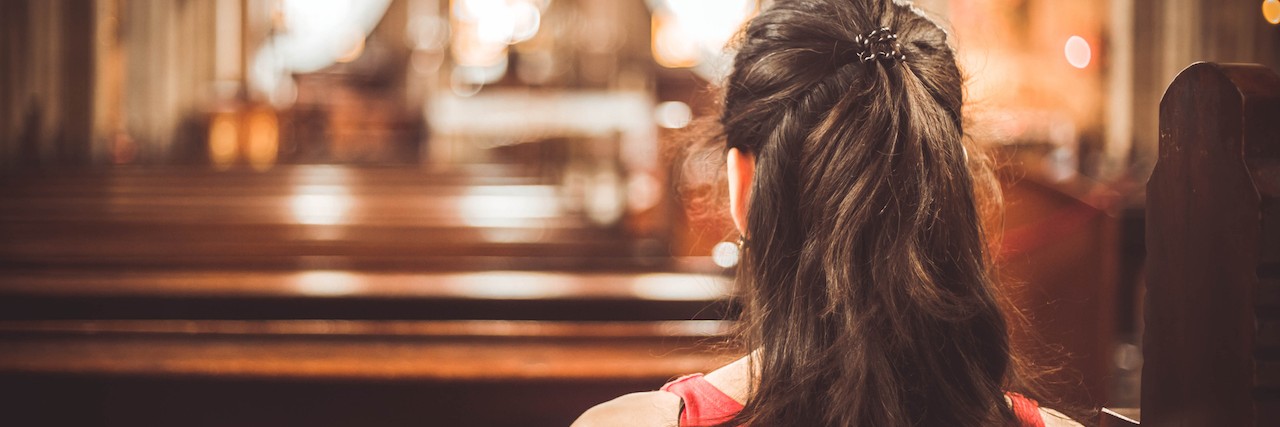One year on Easter Sunday, I was feeling suicidal. My husband, who is a pastor, left before dawn to superintend the sunrise service, as he always does. I woke hours later to wrangle our four children into whatever Easter best we’d patched together from hand-me-downs and Value Village, as I always do. My mom was in town, so that helped, and we made it to church without more than the usual yelling for lost shoes.
After church we gathered for a family photo, since the fancy clothes thing doesn’t happen often. Then my mom and my husband took the kids off in the minivan to an Easter egg hunt at a church member’s house, while I went home alone in our ancient sedan to put the ham in the oven.
It was on the drive home that the thoughts attacked. Three or four plausible and immediate scenarios for ending my own life careened into my brain. Each one illuminated itself in horror-movie detail, a kamikaze film sequence that felt strangely seductive while at the same time producing angst-ridden guilt: I’m a terrible, terrible mother!
Having bipolar disorder puts me at a clear and frightening increased risk of suicide. So does my history of childhood sexual abuse. Given those risks, though: why those particular thoughts, on that particular day? From late winter into early spring, a glum blue haze had settled over me, but I’d held up my end of the medication-and-counseling bargain, and I thought I was doing OK.
The intensity of my thoughts both surprised and scared me. I gripped the steering wheel and promised myself I wasn’t going to act on them. I hoped the part of me doing the promising was the trustworthy part.
I managed to push my thoughts aside long enough to make my way home and start the ham on schedule. I felt shaky, uncertain of myself. I paced and trembled, trying to settle myself enough to do the dishes or something useful until everyone else arrived. When they finally did, I was thankful they’d come home to an undead mother.
It took me a while to decide to go public with my brush with suicide. But recently, I’ve come to know two of my friends have also wrestled with suicidal feelings in the past year. Their struggles, like mine, have been silent and invisible. Public opinion pushes the dreadful weight of suicidal feelings even further underground. No one wants to admit to even thinking about something that everyone knows is “selfish” and “unforgivable.”
Especially when you are a mother. “How could you?” echoes in our ears, a haunting refrain that may only keep us from getting the help we need. And so, I share my story in solidarity with my friends and with all those who bear this burdensome secret.
Please hear me: suicide is a terrible choice, and I do not want to condone or encourage it in any way. But just because we’ve thought those thoughts doesn’t mean we are selfish or unforgivable or awful mothers. It means this: we are vulnerable. We need healing. We need compassion, both from ourselves and from those around us.
Each year on Easter, we festoon our sanctuaries with lilies, sing triumphantly of the risen King, and declare our intention to live as Easter people. Yet we still live in a world where, somewhere, someone – pastor’s wife or back-pew visitor – will drive home after all that and think about making an end of things. We live, truly, with the now and the not yet: the world as it is, and the hope of the world as it should be.
Sometimes at night, when I can’t sleep, I invite the Broken Man to come inhabit my body with his own. From tip to toe, I imagine Jesus who died and whose resurrection we celebrate each Easter crawling gently inside me, at once filling me with his presence and absorbing all of my troubles into his own understanding. It helps.
I don’t have all the answers, about suicide or anything else. I can say that life on this planet, from where I’m sitting, is scary sometimes. But I still believe in the One who came to walk among us. In his death and resurrection, I still look forward to the redemption of all things, my own life included, by the grace of God.
And next Easter, I plan to still be around to sing about it.
Follow this journey on Sarah L. Sanderson.
If you or someone you know needs help, see our suicide prevention resources.
If you need support right now, call the Suicide Prevention Lifeline at 1-800-273-8255.

